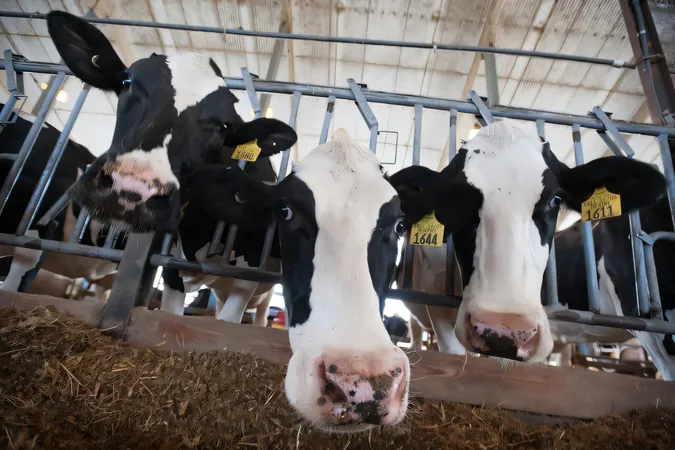
Revolutionary Sugar Solution Rivals Antibiotics in Battling Cow Infections!
2024-12-19
Author: Wei Ling
A groundbreaking study from Penn State has ushered in an exciting potential alternative to antibiotics for treating common infections in dairy cows—a concentrated sugar solution. Published in the journal *Frontiers in Veterinary Science*, researchers have uncovered astonishing results that could reshape veterinary practices while also aiding in the fight against antimicrobial resistance.
The Importance of the Study
Adrian Barragan, an associate research professor and extension veterinarian at Penn State, emphasized the study's importance, particularly for the organic dairy industry where the use of antibiotics is heavily restricted. He noted this innovative approach could set the stage for further research into sugar-based treatments for similar infections in humans, such as endometritis—an infection that impacts women post-childbirth.
Addressing Uterine Infections
"It's a game-changer for addressing uterine infections," remarked Erika Ganda, an assistant professor focused on food animal microbiomes and co-lead author of the study. "After calving, clinical metritis—an infection of the uterus—poses significant health risks to dairy cattle. We strive to use antibiotics judiciously to ensure both animal welfare and prevent milk contamination. Reducing antibiotic use not only protects cow health but also mitigates the risk of resistant bacteria affecting farm workers and larger communities."
The Research Objective
The implications of this research come at a crucial time when antimicrobial resistance poses a major threat in both human and veterinary medicine. A key objective of this research was to evaluate a non-antibiotic alternative against traditional treatments. The study specifically focused on clinical metritis, a condition that if untreated can escalate into severe health issues for cattle. Typically, this infection is treated with systemic antibiotics like ceftiofur, effective but feared to contribute to growing resistance trends.
Fundamental Questions
"In our search for alternative therapies for metritis, we posed two fundamental questions: Does the treatment cure the animals? Are their performances similar post-treatment?" Barragan explained. While results indicated that the cure rates for both sugar and antibiotic treatments were comparable, performance outcomes varied based on the initial disease severity.
The Role of Intrauterine Dextrose
The researchers zeroed in on intrauterine dextrose, a high-concentration sugar solution known for its ability to plasmolyze harmful bacteria—essentially dehydrating them to death. Having shown promise in human wound care, this study marked a novel application in livestock health management.
Key Findings of the Study
"We were genuinely excited to discover that both treatments were similarly effective for mild cases of metritis," Barragan shared. Conducted on a dairy farm in central Pennsylvania, the study monitored 77 cows diagnosed with clinical metritis, splitting them into two groups to receive either intrauterine dextrose or systemic ceftiofur. Recovery rates were closely tracked and advanced DNA sequencing analyzed the cows' uterine microbial communities to gain insights into their overall microbiome health.
Encouraging Results
Despite the relatively small sample size, the findings were encouraging. The results indicated that dextrose could serve as an equally effective treatment for mild cases of metritis without disrupting the microbial balance in the cows’ reproductive tracts, a common side effect linked to antibiotic use.
Long-term Health Benefits
"The dextrose solution showed remarkable promise without altering the natural bacterial ecosystems as antibiotics often do," Ganda noted. "This can significantly benefit the long-term health of the cattle."
Looking Ahead
As researchers continue to explore the broader implications of dextrose, including its potential in human medicine, Barragan concluded, "Our findings may be a stepping stone toward novel treatments for reproductive diseases in people as well—initial inspiration stemming from sugar-based wound therapies."
Stay tuned, as this thrilling research might not only impact dairy farming but could revolutionize treatments for human conditions too!


 Brasil (PT)
Brasil (PT)
 Canada (EN)
Canada (EN)
 Chile (ES)
Chile (ES)
 España (ES)
España (ES)
 France (FR)
France (FR)
 Hong Kong (EN)
Hong Kong (EN)
 Italia (IT)
Italia (IT)
 日本 (JA)
日本 (JA)
 Magyarország (HU)
Magyarország (HU)
 Norge (NO)
Norge (NO)
 Polska (PL)
Polska (PL)
 Schweiz (DE)
Schweiz (DE)
 Singapore (EN)
Singapore (EN)
 Sverige (SV)
Sverige (SV)
 Suomi (FI)
Suomi (FI)
 Türkiye (TR)
Türkiye (TR)